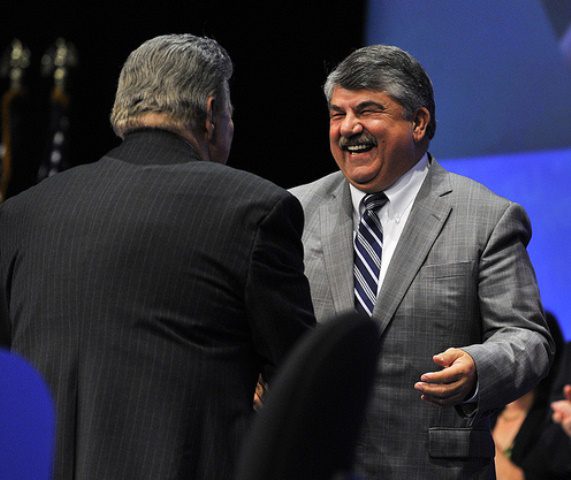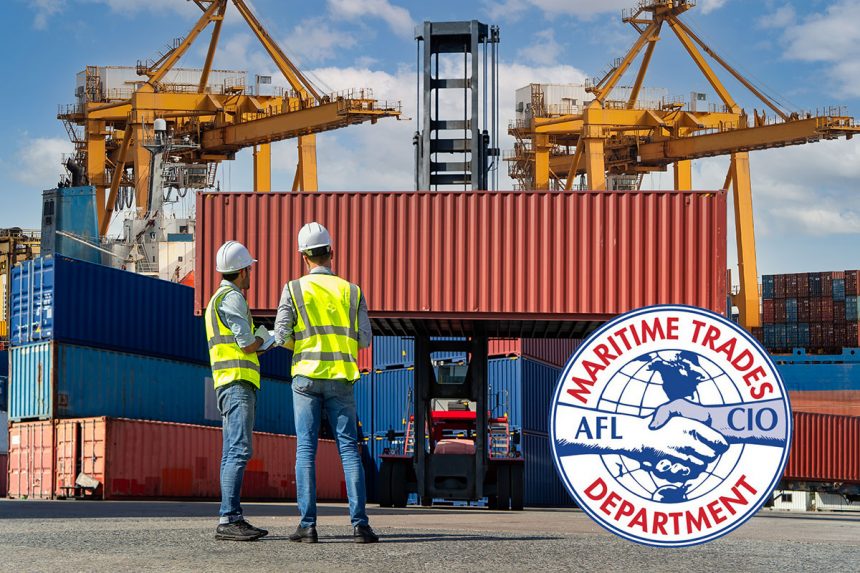
Big news and a national spotlight on the labor movement emerged from Los Angeles as the AFL-CIO gathered for its quadrennial convention.
Highlighted by the federation’s decision to open itself to non-union workers, the re-election of its president and secretary-treasurer and the election of the organization’s first foreign-born executive vice president, the convention made headlines throughout the country from Sept. 8-11.
MTD President Michael Sacco, who as the head of the Seafarers Union is the longest-serving vice president on the federation’s executive council, acted as the convention’s election chairman. He presided over the podium as the AFL-CIO re-elected President Richard Trumka and Secretary-Treasurer Liz Shuler to second terms and elected Ethiopian-born Tefere Gebre executive vice president. Gebre is the first foreign-born person to serve in one of the federation’s top three leadership positions.
In his acceptance speech, Trumka outlined the convention’s main theme and the labor movement’s long-term goals. The AFL-CIO, he said, must transcend its role as a federation of unions. The AFL-CIO must join with allies and become an entire movement itself.
“We must work as one and rise as one and speak as one,” Trumka said, adding that by doing so the movement could better combat economic inequality, stagnant wages and the struggles facing the middle class. “Together we can take this county back … and again make it a nation of the people, by the people and for the people.”
To achieve this objective, federation officials decided to expand the organization’s base beyond union workers. In resolutions and speeches, AFL-CIO members announced the organization would open itself to non-union members as well – a move designed to position the federation as part of a movement for the entire middle class, not just card-carrying union members.
“We’re on the verge of creating a labor movement that speaks for all workers,” Gebre said. “It doesn’t matter if you have a (union) card in your pocket or not.”
The move was seen by officials as necessary. Trumka acknowledged “we know we’re in a crisis right now,” and said that “none of us are strong enough” or organized enough to change the anti-worker political climate created by the deep pockets of corporate America. To fight such powerful interests, Trumka said, the entire progressive movement and middle class must unite under the same banner of change.
“None of us are big enough” to create those changes, Trumka said during a pre-convention press conference, speaking of unions, environmentalists, immigrant and civil rights groups – all of which participated in a six-month listening session prior to the convention.
“We want to change our relationship” with the other groups “from transaction to transformational,” Trumka said. “What we used to do is to get a plan and go to our allies and say, ‘Here’s a plan, sign on.’ Sometimes it worked; sometimes it didn’t. Now we’ll say, ‘Here’s a problem. Let’s create a strategy.”
That process will now allow those outside groups into labor’s councils, though the exact role and influence of the groups has yet to be revealed.
“The AFL-CIO has as a founding ideal (for) the assembling of a broad progressive coalition for social and economic justice,” read the AFL-CIO resolution that formally brought outside groups into labor’s councils. “Our partnerships need to be rooted, dynamic and abiding and we must extend the frontiers of our relationships, building on the values we share.”
While the news of the federation opening its ranks to non-union members created national headlines, it wasn’t the only development from the convention to attract widespread attention.
The AFL-CIO’s criticism of the Affordable Care Act – the Obama administration’s signature health care achievement and a law that was originally supported by the labor movement – surprised many.
In a resolution voted on by delegates, the federation called the law “highly disruptive” and warned that the law could negatively impact low- and moderate-income union members and their collectively bargained health care plans.
“Contrary to the law’s intent, some workers might not be able to keep their coverage and their doctors because the federal agencies’ current implementation plans will be highly disruptive to the operation of Taft-Hartley multiemployer plans,” the resolution read.
Despite the wide-ranging topics of discussion and activities, the main theme of the convention centered on revitalizing the middle class and ensuring all Americans have a shot at the American Dream. When it comes to those priorities, Trumka said, the AFL-CIO and the labor movement as a whole would continue the fight for as long as it takes.
“Tonight in America, a child will go to sleep with a stomach growling with hunger…. An immigrant father will sit behind bars waiting to be deported…. A father will sit down to dinner knowing he is falling out of the middle class and the mother is struggling in a minimum wage job,” Trumka said.
“The question is who will speak up for them? The answer is we all will,” Trumka added. “We will stand up for everyone who gets up and goes to work.”
Also addressing the delegates during the four-day gathering were Secretary of Labor Thomas Perez and Senator Elizabeth Warren (D-MA).
“As I grew older, I grew to conclude that it’s not God’s will that people who work a 40-hour week should live in poverty,” Perez told the convention. “That it’s not God’s will that a coal miner should not live to see his children graduate. That it’s not God’s will that there are 11 million people in the shadows.
“We’ll work to promote job creation and job safety – because it’s the right thing to do in the United States of America!” Perez declared.
Warren roused the audience: “We know even though pundits and big corporate lobbyists in Washington might need to be dragged kicking and screaming, we know America agrees with us! We believe Wall Street needs stronger rules and tougher enforcement, and you know what? So do more than 80% of people. Wall Street will fight us, but the American people are on our side.
“In every fight to build opportunity in this country… in every fight for working families, we have been on the front lines because our agenda is America’ agenda.”
Convention delegates endorsed the campaign for immigration reform and labor law reform. The AFL-CIO welcomed the UFCW back into the house of labor. It expanded its executive council to 55 members, adding Joseph Hansen and Stuart Applebaum from the UFCW as well as electing new members Harold Daggett of the ILA, Bhairavi Desai of the National Taxi Workers Alliance, James Grogan of the Insulators and Paul Rinaldi of NATCA.

